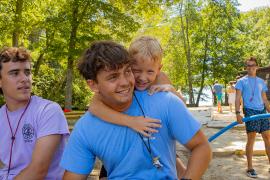Mariana and Jessica are exasperated with one another. Mariana thinks the girls they share responsibility for as co-counselors are way too noisy and messy. She is always the one who gets these rambunctious fifth graders to quiet down or finish their cabin cleanup chores. Because she is typically the counselor who speaks up first, the girls have begun to favor Jessica, whom they see as "nicer." Jessica, who went to camp here as a camper, thinks that Mariana is too strict. She feels Mariana doesn’t understand that camp is a place where you get to "chill" — to take a break from the pressures of school and the "TEA" (the juiciest gossip, typically shared between friends on Snapchat and Instagram; it is a bonding tool for people who come together when they share it, and is usually about someone you know, but can also extend to celebrities, random internet scandals, and so on.). Jessica thinks Mariana needs to lighten up. Her response to Mariana, often delivered in front of the girls, doesn’t help the situation much. "It’s camp! Lighten up!" she says. This only makes Mariana fume.
The Critical Five
You and your co-counselor(s) can benefit from five critical parameters or personal tendencies by reflecting on and then sharing the following. These are the areas that will most directly impact the way the two (or three or four) of you work together with your campers and even with other staff members:
- Do you tend to be an introvert or an extrovert?
- Are you a night owl or a morning person?
- Do you tend to have a high or low tolerance for noise, mess, and "organized chaos"?
- What is your preferred style when it comes to planning things? Are you a go-with-the-flow kind of person, or do you prefer to spell it all out ahead of time?
- What is your experience with and your go-to when it comes to discipline?
Knowing beforehand how you stack up in these areas and how your co-counselor(s) compares with you can help both (or all) of you to plan ahead and avoid being at odds with one another.
Introvert or Extrovert
Whether you tend to be an introvert or an extrovert may have a big impact on how you connect with people (campers and other staff), as well as how you go about recharging your batteries (by being alone or with other people) and how comfortable you feel taking the lead in various situations (Cain, 2012). The point in knowing your tendency on this measure is, again, so you can plan ahead with your co-counselors. For example, if you are both introverts, you are going to have to agree ahead of time on who will take the lead in a group situation with campers. You may also have to talk more intentionally about who is going to hang with the very active kids while the other is with the quieter kids. As I have often joked, camp was designed for extroverts in that everything is done in groups. You change together, do activities together, eat together, clean up together, fight together, and play and make up together! To be an introvert at camp means learning how to function as an introvert in an extroverted world.
How do you know if you tend one way or another? I have a 10-point questionnaire with a scoring system that serves as an activity to help you evaluate yourself. You can request it from me by emailing [email protected]. In the meantime, here are the basic questions:
- Do you tend to rejuvenate and draw energy for yourself from time alone rather than from time with others?
- Do you do your best work alone?
- Do you worry, get anxious, and "rehearse" in your sleep when you have to stand in front of a group and give a talk or presentation?
- When you are at a party or social gathering, even if you are having a good time, do you find you take breaks from the group and head to the bathroom, step outside, or go into another room to be by yourself or one-on-one with just one other person?
- Do large crowds drain you rather than excite you?
- Does a lot of exposure to noise, light, activity, or other high levels of stimulation tire you out or leave you drained, spacey, or with a headache?
- When you were in school/college did you dread speaking up in class? Did you get flustered or have to work up your nerve to speak even if your points were solid and well received?
- Does sudden public attention in a group or social setting turn your face red?
- Do you have an active inner dialogue, and do you tend to ruminate a lot about your decisions or actions?
- Do you feel pressure to perform, "get out there," or get ahead in your career when you would rather stay home or keep a lower profile?
The more you answer "yes" to these questions, the more on the introverted end of the spectrum you are. If you are more introverted, you will need to be even more deliberate about finding time to get away from others to recharge your batteries. This will take some planning ahead and coordinating with your co-counselors. Finding time to be by yourself at resident camp or resisting the draw of social engagements during the week at day camp can be a challenge.
If, like many people, you find that you tend to be more introverted but have learned to function well in an extrovert-oriented environment (like camp), you still need to find ways to get away from the crowds to renew your energy level.
If you tend toward the more extroverted end of the spectrum, your challenge is to figure out how to withdraw from the stimulating environment that camp is for most extroverts and get some rest. Otherwise, you may burn out before the end of the season.
Night Owl or Early Bird
People tend to be either night owls (they get a second wind late into the evening) or early birds (they love to be up early and have more energy at the start of the day). Your tendency to be one or the other will have a big impact on you and your co-counselors at camp. Early birds do better on those early morning day camp bus runs, or when it comes time to wake up the campers in the morning at resident camp. Night owls, on the other hand, are better suited for getting kids to bed and for those after-bedtime talks that sometimes arise with a homesick or upset camper who just can’t get to sleep. If both you and your cabin co-counselor are in the same category, plan out how you will deal with those times when you are either both half asleep or both raring to go! If you are opposites, make sure you have compassion for your co-counselor when the time of day is challenging their circadian rhythm.
Tolerance Level for Chaos
One of the most important characteristics for you and your co-counselor(s) to discuss is how each of you tolerates things like noise, activity level, and how chaotic things can get when working with children. A person with a lower tolerance for noise and mess is more likely than someone with a higher tolerance to step in and try to calm the kids down. This discrepancy can lead to all kinds of misunderstandings among co-counselors. Counselors with a lower tolerance level will step in more quickly and often feel like their partners are not doing their part to restore order. The campers themselves always notice this difference and may begin to favor the more tolerant counselors because they will feel less judged by them. This split can lead to one staff member not only feeling like they are working harder than the other, but that the other counselor is turning the campers against them. For this reason, reflecting on and sharing your tolerance level tendency is important to avoid unnecessary conflict.
Planning Ahead/Go with the Flow
Differences in planning style — the tendency to plan things ahead versus "winging it" — can also be a potential source of conflict. Let’s say that you and your co-counselor want to have a cabin or group meeting with your campers, and only one of you is the "go with the flow" type. A struggle around planning can adversely affect how that meeting will go. For example, are you clear about:
- What you want to cover and what you want to get out of the meeting?
- Who is starting?
- How you will explain the theme or purpose of the meeting to the campers?
- Who will be responsible for bringing up which points?
- How long the meeting will be?
- When the best time is to have the meeting?
- How and when you will end the meeting and who speaks last?
If one of you resists planning, you may find yourselves in the middle of the meeting going in different directions in front of the kids. "Surprises" may come up because you didn’t talk it out ahead of time — subjects that are unproductive or that you are not prepared to talk about. The point is to have enough of a dialogue with your co-counselor that you appear organized and on the same page in front of the kids. As I often say, surprises are for birthdays, not camp!
Discipline
You may never have thought about your discipline style before, or how you were disciplined growing up, but there are four general categories when it comes to how adults parent children (Bright Horizons, 2020):
Authoritarian
This is a kind of my-way-or-the-highway, strict style where the parents exert external control over their kids. This style of parenting often includes punishment and little flexibility. Communication is often one-way, from the parent down to the child without much listening or considering what the child is experiencing. Whatever the rules are in the home, they are strictly enforced and seldom explained. Kids are just expected to know and act accordingly.
Permissive
Permissive or indulgent parents mostly let their children do what they want and offer limited guidance or direction. Such adults are more like friends than parents. Communication is open, but these parents let children decide for themselves rather than giving direction or holding their kids accountable. Parents in this category tend to be warm and nurturing. Expectations are typically minimal or not set at all.
Uninvolved Parenting
Uninvolved parents give children a lot of freedom and generally stay out of their way. Some parents make a conscious decision to parent in this way, while others are less interested in parenting or unsure of what to do. An uninvolved parent lets a child mostly do what they want, probably out of a lack of information or, possibly, caring. This group of parents offers little nurturing and set few or no behavioral expectations.
Authoritative Parenting
Authoritative parents are reasonable and nurturing and set high expectations, which they articulate clearly and often. Children with parents who demonstrate this style tend to be self-disciplined and think for themselves. This style is thought to be most beneficial to children because the disciplinary rules are clear and the reasons behind them explained. Communication is open (two-way), ongoing, and appropriate to the child’s level of understanding. Authoritative parents and counselors tend to be nurturing, even while expectations and goals are high but stated clearly. As children get older, they may have input into their own goals.
As a counselor, you may have strong feelings, either positive or negative, about the way your parents disciplined you. These feelings will get stirred up when you encounter campers who, in a given moment, can’t self-regulate. For example, when campers are teasing one another and becoming hurtful or overly aggressive; or when campers aren’t cleaning up, either in a cabin or at an activity, and someone needs to step in and prompt them. You and your co-counselors must share with one another what your beliefs are with regard to your own default "parenting" styles. Even though you are likely not parents, you will be in situations where you will have to discipline your campers. Whether you have had similar parenting experiences or very different ones, you will have to discuss how you want to approach your campers so you are all on the same page. You don’t want your campers to get different messages from each of you about what is and is not OK at camp. Also, think about the general style of parenting your campers have experienced back in their respective households. If the approach you and your co-counselor(s) have is strikingly different from the experiences your campers have had, you will have to help your campers make some adjustments to how things are run at camp.
Closing Thoughts
Working together with one or more co-counselors is as much an exercise in growth as any other part of camp. The most important aspect of a strong, positive co-counseling relationship is that you talk to one another. No one is right or wrong. Share your different backgrounds and experiences with one another and appreciate that another person’s experience — their "truth" — does not negate yours. It is simply different, and that will require communication without judgment. If things become tense and less workable for the two (or more) of you, ask a trusted senior staff member to facilitate a conversation to help you get on the same page. For a guide on the conversation you and your co-counselors can have before the campers arrive, email me at [email protected].




